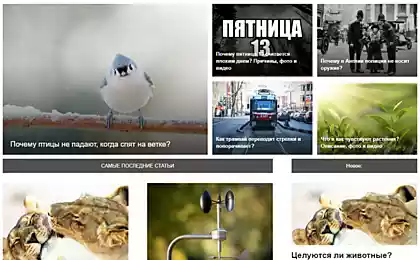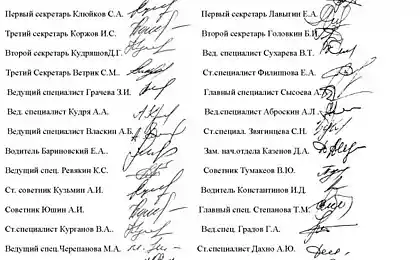1454
Facts about Carnival (9 photos)
Friends, due to the fact that the yard maslennichnaya week, I decided to tell you some interesting facts about this Russian holiday:
1. Interestingly, the Mardi Gras - the only pagan holiday, officially recognized by the Russian Orthodox Church. In the Christian Orthodoxy, he was called "cheese" or "Cheese-fare" Week (week). Even the name "Carnival" this holiday was only from the 17th century, when it was included in the holy days and the time is shifted closer to the beginning of the year.
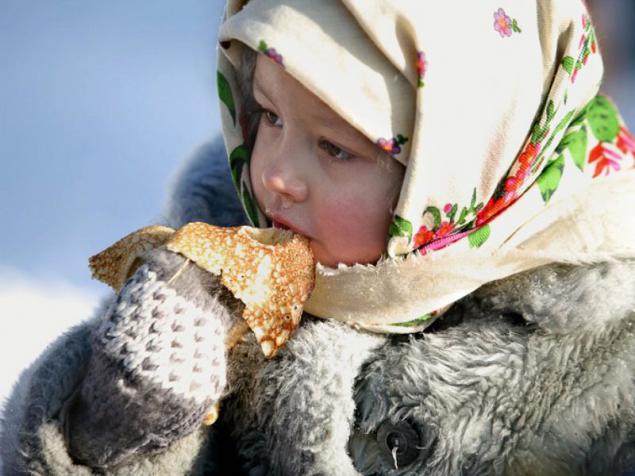
2. The date of this holiday is now always depends on the date of Easter: Carnival begins 56 days (8 weeks) before Easter and lasts one week, Monday to Sunday. And the name "Carnival" had at the time that the modified holiday, because in that period of time - the last week before Lent - Church statute forbids believers to eat meat, but allows eating butter, dairy products, eggs and fish.

3. Although there is another option: Perhaps the name of this festival is one of the names of ancient Slavic goddess Lely. It is one of the most multifaceted goddesses present him to the human genus is in the form of a gentle girl, and then on the vernal equinox - pyshnoteloy, with ruddy cheeks Shrovetide. And sang about Shrovetide like this: "Come thou to us for a wide courtyard: In the mountains go, lie in a pancake, make fun of the Heart. Mardi Gras - Red beauty, Light brown braid Thirty brothers sister, granddaughter Forty grandmothers, mothers Three daughter kvetochka, Berry, Perepelochka ».
4. The Russian people at all times loved Pancake Day. Holiday rituals were painted by day, and it was very important to adhere to them.
On Monday Shrove Tuesday met: made of straw scarecrow singing took him on a sled through the village. Tuesday - Zaigryshi when the fun begins: There were also booths with parsley, and going from house to house mummers.
Wednesday - Gourmet: feast started with pancakes and other dishes.
Thursday - Revelry (Fracture, Wide Thursday): Shrove were heated fights, which had its own strict rules. It was impossible, for example, beat the lying (remember the saying "do not beat lying»?).
Friday - Teschin evening, and a number of oil-yielding practices focused on the future weddings and honeymooners (residues matrimonial rites). Disrespect in-law for this event was considered a disgrace and insult, becomes an occasion to eternal enmity between him and the mother-in.
Saturday - Zolovkina gatherings: young daughter (his wife who came were considered "out of nowhere", because it was decided to take the marriage) hosted relatives.
Sunday - Farewell, Farewell day (or Shrove Sunday) certainly all greeted each other with a kiss and said, "Please forgive me." And they answered, "God will forgive you." With the same purpose in Forgiveness Sunday went to the cemetery, left on the graves of pancakes, prayed and worshiped ashes relatives.
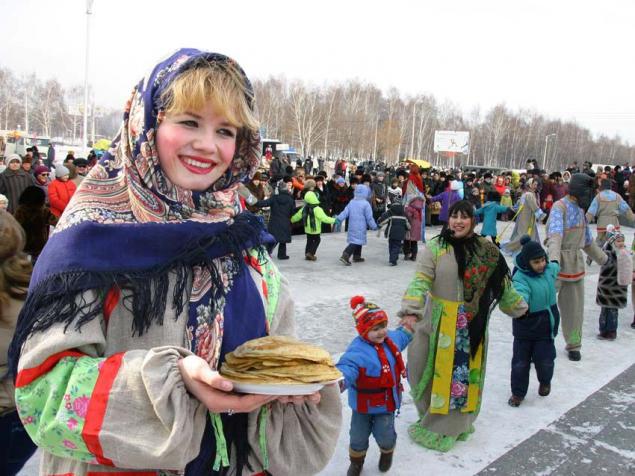
And on the last day of Maslenitsa burned an effigy of winter. Many people think that this is an effigy of Maslenitsa, but there is not Pancake burn and winter escort!
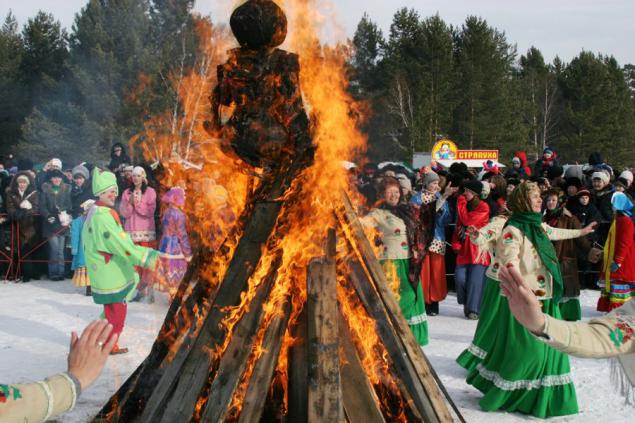
5. Another very important sign of Shrovetide last century - bear fun. This popular game is mentioned several times in the "Domostroi", condemning it as one of the "demonic land", "bogomerzkih affairs." But, in spite of prohibitions and persecutions, bear fun continued to exist, fun and pleasing people.
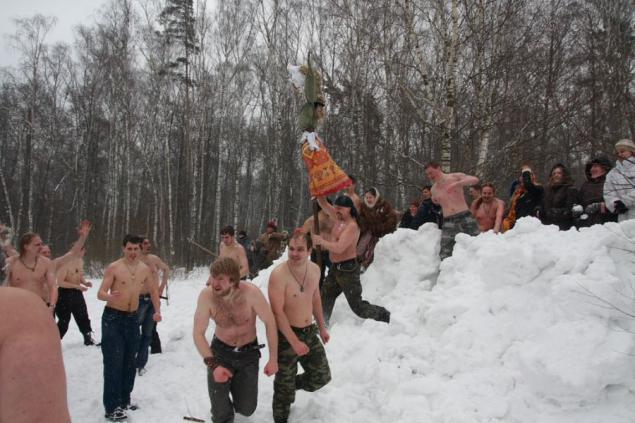
6. Where did this come from stable Maslenitsa celebration, since we are celebrating it since ancient times and today? Initially, our distant ancestors (Orthodox, as they praised the rule - the world of the gods of light) festival was called - Komoeditsa. And he says always at the same time - in the astronomical vernal equinox (20 or 21 March by the modern calendar), after which the day becomes longer than the night, nature awakens and Jari-sun melts the snow.
Why Komoeditsa? "Com" - as our ancestors called bear. Bears scented spring - woke up. People brought "pancake victim" great honeys beast: here - "the first pancake comas" t. E. The bears. It is us, the ignorant, heard differently, "better luck next time." Bear - a "boss", "Veda (honey)," and honey for the Russian people - the source of life and health.
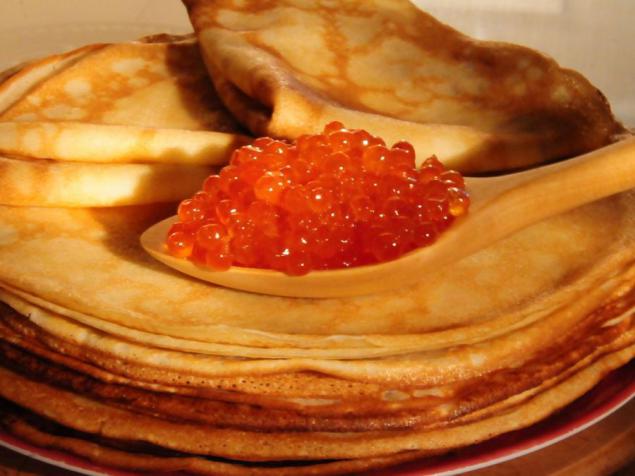
7. By the way, the word "pagan" - means "popular" (Old Slavic word "language" means - "the people"). And damn it - of course, the symbol of the sun, because he, like the sun, yellow, round and warm. And the ancients believed that, along with a pancake they eat a piece of its heat and power.
8. It is known that in 988, the year Rus was baptized. And baptized (from this fact can not be avoided) by force. Everyone, including small children, squads Vikings spears were driven to baptism in the river, and the river, according to the chronicler, "reddened with blood ..." enslaved Slavs permanently lost their roots and spiritual connection with the ancient ancestors.
Manage such people become more convenient. But people will never forget their traditional Shrove Tuesday and, despite persecution by the Church and the authorities continued throughout her celebrate. And custom-Komoeditsy Shrovetide reached our 21st century has survived many historical perepity, even in the middle of the last century (in Soviet times), the holiday is widely celebrated here in Daugavpils.
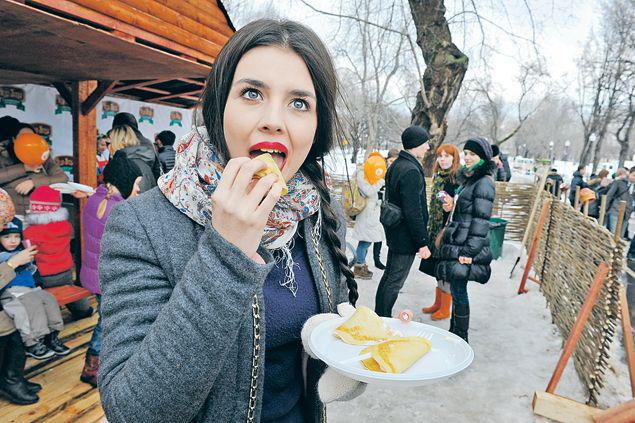
9. sacred meaning of this holiday a truly cosmic: Slavs it was a celebration of resurrection Earth. Fire Dazhdbog scored in Svarga for long winter forces leave Heaven and come to awakening Earth warms her heart, gives her young Hope Springs, Lelia.
Holiday full of ritual symbolism that helps to meet the crisis - the beginning of the annual cycle of the life of nature. O f course, over time, become a popular Mardi Gras fun Ranged "obzhornoe" secular festivities, lost ancient sacred meaning of the solemn meeting on the prevalence of the day and night consecration union of each member of the genus with their great ancestors. But you will agree, this is one of the most emotional events of our time.
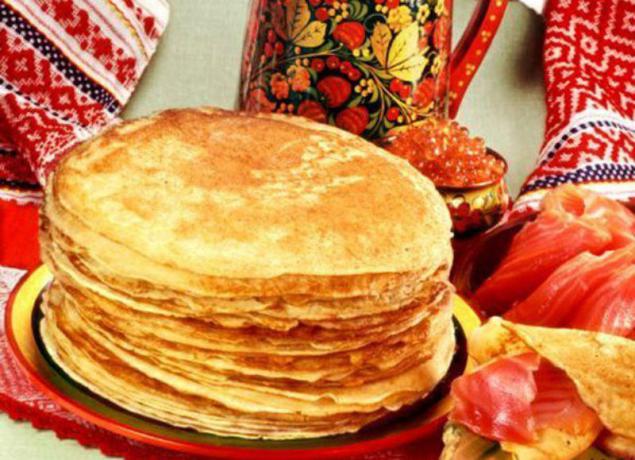
10. The details of the Slavic pagan religious rituals pre-Christian times, which led the Magi, we know little.
Attempts to reconstruct them on the basis of the extant historical documents of Western Europe, Ireland and England about the rites of this Slavic Komoeditse (Rite of Spring) Western pagan festival Beltane (also spring holiday religion of the Druids) is very conditional.
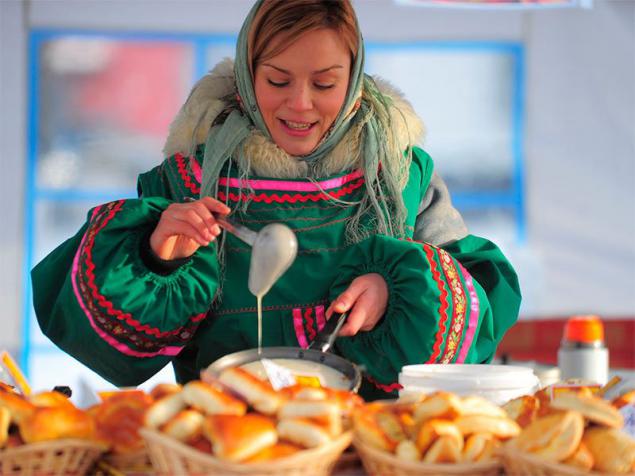
By the way, the spring festival - one more proof that the people of Europe originate from one of the great pranaroda. For example, in Cologne Shrovetide festivities are called "fastelovend» (Fastelovend), and in Mainz - "fassenaht» (Fassenacht).
Far-famed Pancake carnival in the Rhineland - Rhineland. The local carnival - it's unbridled joy from Thursday to Tuesday. Analogue Maslenitsa is still celebrated in the Czech Republic, Denmark, England.
1. Interestingly, the Mardi Gras - the only pagan holiday, officially recognized by the Russian Orthodox Church. In the Christian Orthodoxy, he was called "cheese" or "Cheese-fare" Week (week). Even the name "Carnival" this holiday was only from the 17th century, when it was included in the holy days and the time is shifted closer to the beginning of the year.

2. The date of this holiday is now always depends on the date of Easter: Carnival begins 56 days (8 weeks) before Easter and lasts one week, Monday to Sunday. And the name "Carnival" had at the time that the modified holiday, because in that period of time - the last week before Lent - Church statute forbids believers to eat meat, but allows eating butter, dairy products, eggs and fish.

3. Although there is another option: Perhaps the name of this festival is one of the names of ancient Slavic goddess Lely. It is one of the most multifaceted goddesses present him to the human genus is in the form of a gentle girl, and then on the vernal equinox - pyshnoteloy, with ruddy cheeks Shrovetide. And sang about Shrovetide like this: "Come thou to us for a wide courtyard: In the mountains go, lie in a pancake, make fun of the Heart. Mardi Gras - Red beauty, Light brown braid Thirty brothers sister, granddaughter Forty grandmothers, mothers Three daughter kvetochka, Berry, Perepelochka ».
4. The Russian people at all times loved Pancake Day. Holiday rituals were painted by day, and it was very important to adhere to them.
On Monday Shrove Tuesday met: made of straw scarecrow singing took him on a sled through the village. Tuesday - Zaigryshi when the fun begins: There were also booths with parsley, and going from house to house mummers.
Wednesday - Gourmet: feast started with pancakes and other dishes.
Thursday - Revelry (Fracture, Wide Thursday): Shrove were heated fights, which had its own strict rules. It was impossible, for example, beat the lying (remember the saying "do not beat lying»?).
Friday - Teschin evening, and a number of oil-yielding practices focused on the future weddings and honeymooners (residues matrimonial rites). Disrespect in-law for this event was considered a disgrace and insult, becomes an occasion to eternal enmity between him and the mother-in.
Saturday - Zolovkina gatherings: young daughter (his wife who came were considered "out of nowhere", because it was decided to take the marriage) hosted relatives.
Sunday - Farewell, Farewell day (or Shrove Sunday) certainly all greeted each other with a kiss and said, "Please forgive me." And they answered, "God will forgive you." With the same purpose in Forgiveness Sunday went to the cemetery, left on the graves of pancakes, prayed and worshiped ashes relatives.

And on the last day of Maslenitsa burned an effigy of winter. Many people think that this is an effigy of Maslenitsa, but there is not Pancake burn and winter escort!

5. Another very important sign of Shrovetide last century - bear fun. This popular game is mentioned several times in the "Domostroi", condemning it as one of the "demonic land", "bogomerzkih affairs." But, in spite of prohibitions and persecutions, bear fun continued to exist, fun and pleasing people.

6. Where did this come from stable Maslenitsa celebration, since we are celebrating it since ancient times and today? Initially, our distant ancestors (Orthodox, as they praised the rule - the world of the gods of light) festival was called - Komoeditsa. And he says always at the same time - in the astronomical vernal equinox (20 or 21 March by the modern calendar), after which the day becomes longer than the night, nature awakens and Jari-sun melts the snow.
Why Komoeditsa? "Com" - as our ancestors called bear. Bears scented spring - woke up. People brought "pancake victim" great honeys beast: here - "the first pancake comas" t. E. The bears. It is us, the ignorant, heard differently, "better luck next time." Bear - a "boss", "Veda (honey)," and honey for the Russian people - the source of life and health.

7. By the way, the word "pagan" - means "popular" (Old Slavic word "language" means - "the people"). And damn it - of course, the symbol of the sun, because he, like the sun, yellow, round and warm. And the ancients believed that, along with a pancake they eat a piece of its heat and power.
8. It is known that in 988, the year Rus was baptized. And baptized (from this fact can not be avoided) by force. Everyone, including small children, squads Vikings spears were driven to baptism in the river, and the river, according to the chronicler, "reddened with blood ..." enslaved Slavs permanently lost their roots and spiritual connection with the ancient ancestors.
Manage such people become more convenient. But people will never forget their traditional Shrove Tuesday and, despite persecution by the Church and the authorities continued throughout her celebrate. And custom-Komoeditsy Shrovetide reached our 21st century has survived many historical perepity, even in the middle of the last century (in Soviet times), the holiday is widely celebrated here in Daugavpils.

9. sacred meaning of this holiday a truly cosmic: Slavs it was a celebration of resurrection Earth. Fire Dazhdbog scored in Svarga for long winter forces leave Heaven and come to awakening Earth warms her heart, gives her young Hope Springs, Lelia.
Holiday full of ritual symbolism that helps to meet the crisis - the beginning of the annual cycle of the life of nature. O f course, over time, become a popular Mardi Gras fun Ranged "obzhornoe" secular festivities, lost ancient sacred meaning of the solemn meeting on the prevalence of the day and night consecration union of each member of the genus with their great ancestors. But you will agree, this is one of the most emotional events of our time.

10. The details of the Slavic pagan religious rituals pre-Christian times, which led the Magi, we know little.
Attempts to reconstruct them on the basis of the extant historical documents of Western Europe, Ireland and England about the rites of this Slavic Komoeditse (Rite of Spring) Western pagan festival Beltane (also spring holiday religion of the Druids) is very conditional.

By the way, the spring festival - one more proof that the people of Europe originate from one of the great pranaroda. For example, in Cologne Shrovetide festivities are called "fastelovend» (Fastelovend), and in Mainz - "fassenaht» (Fassenacht).
Far-famed Pancake carnival in the Rhineland - Rhineland. The local carnival - it's unbridled joy from Thursday to Tuesday. Analogue Maslenitsa is still celebrated in the Czech Republic, Denmark, England.







